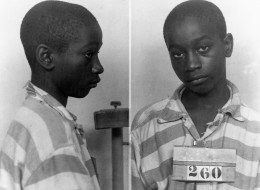COLUMBIA, S.C. (AP) — Supporters of a 14-year-old black boy executed in 1944 for killing two white girls are asking a South Carolina judge to take the unheard-of move of granting him a new trial in hopes he will be cleared of the charges.
George Stinney was convicted on a shaky confession in a segregated society that wanted revenge for the beating deaths of two girls, ages 11 and 7, according to the lawsuit filed last month on Stinney’s behalf in Clarendon County.
The request for a new trial has an uphill climb. The judge may refuse to hear it at all, since the punishment was already carried out. Also, South Carolina has strict rules for introducing new evidence after a trial is complete, requiring the information to have been impossible to discover before the trial and likely to change the results, said Kenneth Gaines, a professor at the University of South Carolina’s law school.
“I think it’s a longshot, but I admire the lawyer for trying it,” Gaines said, adding that he’s not aware of any other executed inmates in the state being granted a new trial posthumously.
The request for a new trial is largely symbolic, but Stinney’s supporters say they would prefer exoneration to a pardon.
Stinney’s case intersects some long-running disputes in the American legal system — the death penalty and race. At 14, he’s the youngest person executed in the United States in past 100 years. He was electrocuted just 84 days after the girls were killed in March 1944.
The request for a new trial includes sworn statements from two of Stinney’s siblings who say he was with them the entire day the girls were killed. Notes from Stinney’s confession and most other information deputies and prosecutors used to convict Stinney in a one-day trial have disappeared along with any transcript of the proceedings. Only a few pages of cryptic, hand-written notes remain, according to the motion.















































































































































































































































![[Video] Chicago Police Officers Caught On Video Telling Two Black Men "We Kill Mother F**kers"](https://earhustle411.com/wp-content/uploads/2018/07/evil-cop-3-300x180.jpg)
![[Video] Chicago Police Officers Caught On Video Telling Two Black Men "We Kill Mother F**kers"](https://earhustle411.com/wp-content/uploads/2018/07/evil-cop-3-80x80.jpg)












![[Video] White Woman Calls The Cops On Black Real Estate Investor, Cops Threaten To Arrest Her For Harassing Him](https://earhustle411.com/wp-content/uploads/2018/05/nosy-neighbor-300x180.png)
![[Video] White Woman Calls The Cops On Black Real Estate Investor, Cops Threaten To Arrest Her For Harassing Him](https://earhustle411.com/wp-content/uploads/2018/05/nosy-neighbor-80x80.png)


![White Scientist Says The Black Community Is Being Targeted By The Medical System, They Are Deliberatly Being Poisoned [Video]](https://earhustle411.com/wp-content/uploads/2016/05/mike-adams-300x180.jpg)
![White Scientist Says The Black Community Is Being Targeted By The Medical System, They Are Deliberatly Being Poisoned [Video]](https://earhustle411.com/wp-content/uploads/2016/05/mike-adams-80x80.jpg)








![Teenage Girl Shot In Her Stomach Three Times But Took Time To Post To Facebook [ Video]](https://earhustle411.com/wp-content/uploads/2016/02/Gangster-chick-300x180.jpg)
![Teenage Girl Shot In Her Stomach Three Times But Took Time To Post To Facebook [ Video]](https://earhustle411.com/wp-content/uploads/2016/02/Gangster-chick-80x80.jpg)







